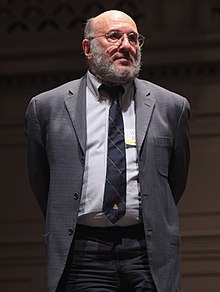Portal:Libertarianism
Introduction
| Part of a series on |
| Libertarianism |
|---|
In the mid-19th century, libertarianism originated as a form of left-wing politics such as anti-authoritarian and anti-state socialists like anarchists, especially social anarchists, but more generally libertarian communists/Marxists and libertarian socialists. These libertarians sought to abolish capitalism and private ownership of the means of production, or else to restrict their purview or effects to usufruct property norms, in favor of common or cooperative ownership and management, viewing private property in the means of production as a barrier to freedom and liberty. While all libertarians support some level of individual rights, left-libertarians differ by supporting an egalitarian redistribution of natural resources. Left-libertarian ideologies include anarchist schools of thought, alongside many other anti-paternalist and New Left schools of thought centered around economic egalitarianism as well as geolibertarianism, green politics, market-oriented left-libertarianism and the Steiner–Vallentyne school. After the fall of the Soviet Union, libertarian socialism grew in popularity and influence as part of anti-war, anti-capitalist and anti- and alter-globalisation movements. (Full article...)
Selected article
Libertarian Marxism refers to a broad scope of economic and political philosophies that emphasize the anti-authoritarian aspects of Marxism. Early currents of libertarian Marxism, known as left communism, emerged in opposition to Marxism–Leninism and its derivatives, such as Stalinism and Maoism.
Libertarian Marxism is also often critical of reformist positions, such as those held by social democrats. Libertarian Marxist currents often draw from Karl Marx and Friedrich Engels' later works, specifically the Grundrisse and The Civil War in France, emphasizing the Marxist belief in the ability of the working class to forge its own destiny without the need for a revolutionary party or state to mediate or aid its liberation. Along with anarchism, libertarian Marxism is one of the main currents of libertarian socialism.
Libertarian Marxism includes such currents as council communism, De Leonism, Socialisme ou Barbarie, Lettrism/Situationism and workerism/autonomism and parts of the New Left. Libertarian Marxism has often had a strong influence on both post-left and social anarchists. Notable theorists of libertarian Marxism have included Anton Pannekoek, Raya Dunayevskaya, CLR James, E. P. Thompson, Rosa Luxemburg, Antonio Negri, Cornelius Castoriadis, Maurice Brinton, Guy Debord, Daniel Guérin, Fredy Perlman, Ernesto Screpanti and Raoul Vaneigem.
Selected quote
| “ | But what the Left That Was demanded was not the symbolic image of the "broken rifle" - so very much in vogue these days in pacifist boutiques - but the training and arming of the people for revolutionary ends, solely in the form of democratic militias. A resolution coauthored by Luxemburg and Lenin (a rare event) and adopted by the Second International in 1906 declared that it "sees in the democratic organization of the army, in the popular militia instead of the standing army, an essential guarantee for the prevention of aggressive wars, and for facilitating the removal of differences between nations.
This was not simply an antiwar resolution, although opposition to the war that was fast approaching was the principal focus of the statement. The arming of the people was a basic tenet of the Left That Was, and pious demands for gun control among today's leftists would have been totally alien to the thinking of the Left That Was. As recently as 1930s, the concept of "the people in arms" remained a basic tenet of independent socialist, no to speak of anarchist, movements throughout the world, including those of the United States, as I myself so well remember. The notion of schooling the masses in reliance on the police and army for public safety, much less turning the other cheek in the face of violence, would have been regarded as heinous. |
” |
| — Murray Bookchin (1921–2006) Social Anarchism or Lifestyle Anarchism (1995) |
Selected picture
 |
General images
Selected biography -
Walter Edward Block (born August 21, 1941) is an American Austrian School economist and anarcho-capitalist theorist. He was the Harold E. Wirth Eminent Scholar Endowed Chair in Economics at the School of Business at Loyola University New Orleans and a former senior fellow of the non-profit think-tank Ludwig von Mises Institute in Auburn, Alabama. (Full article...)
Related portals
Parent portals
Socio-political portals
Topics
Categories
Points of interest
| Points of interest related to Libertarianism on Wikipedia: History – Portal – Category – WikiProject – Alerts – Deletions – Assessment |
Associated Wikimedia
The following Wikimedia Foundation sister projects provide more on this subject:
-
Commons
Free media repository -
Wikibooks
Free textbooks and manuals -
Wikidata
Free knowledge base -
Wikinews
Free-content news -
Wikiquote
Collection of quotations -
Wikisource
Free-content library -
Wikiversity
Free learning tools -
Wiktionary
Dictionary and thesaurus




































